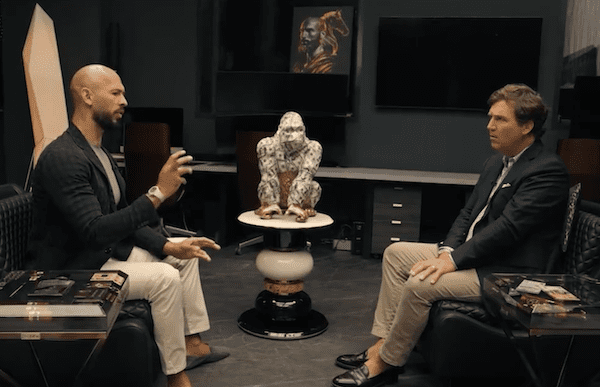An Internet sensation in its own right, Tucker Carlson’s long-anticipated interview with the infamous Andrew Tate has taken the world by storm. The unfiltered, raw conversation pulls back the curtain on Tate’s currently ongoing perplexing legal fight in Romania, revealing aspects previously left unexplored by mainstream media. It’s a scandal steeped in controversy, spun around the world of TikTok, its potential misuse, and the implications of such for individual freedom. Is this another instance of cancel culture run amok or something much more sinister at play? As we delve deeper into the story, prepare for unexpected revelations.
In the detailed, hour-long interview, Carlson adeptly navigates the fraught landscape of Tate’s ongoing legal issues. The charges leveled against Tate in Romania paint him as the ringleader of a group exploiting young women for monetary gain through TikTok views – allegations he vehemently denies. Carlson, known for his hard-hitting questions and incisive approach, brings to light various overlooked details about the case.
Ep. 9 The Andrew Tate interview pic.twitter.com/0KKMzSVmMO
— Tucker Carlson (@TuckerCarlson) July 11, 2023
One critical point Carlson highlighted was the nature of the allegations. The women involved were not subjected to any sexual exploitation, contrary to what some have surmised. Instead, the charges revolve around the perceived coercion to produce content on TikTok for monetary gain. It’s an important distinction that serves to create a more comprehensive picture of the situation.
Andrew Tate, prior to these allegations, had been living a life of financial success and prominence. His journey from a world kickboxing champion to a well-known figure in media spaces has been nothing short of remarkable. The current charges seem almost farcical considering his pre-existing wealth and reputation.
Yet, Tate finds himself under house arrest, facing a potential sentence of five to ten years if convicted. It’s an unimaginable scenario for the former kickboxing champion, who spent 92 harrowing days in a Romanian prison before his release.
While the legal intricacies continue to unfold, Carlson and Tate’s conversation extends beyond the immediate issue. It delves into the dangerous implications of this case on personal freedom and the ongoing culture of cancel politics that often convicts individuals in the court of public opinion before the legal system can reach a verdict.
This interview thus offers more than just insight into Tate’s current predicament; it’s a commentary on the broader cultural trends that have begun to define our times. A mix of personal experiences, professional challenges, and deep-diving into Tate’s perspective on success and financial independence makes this conversation a riveting watch.
The Andrew Tate that emerges from this interview is a complex figure – defiant, provocative, and determined to clear his name. He argues for the importance of context, nuance, and the potential dangers of selective editing, something he believes has played a role in the accusations against him. Yet, he also seems acutely aware of the seriousness of the situation he finds himself in.
In conclusion, Tucker Carlson’s interview with Andrew Tate provides a profoundly needed perspective on a controversy that has swept headlines worldwide. It strips away the rhetoric, peeling back the layers to reveal the man at the center of it all. It’s a story about the pursuit of truth, about taking a stand in the face of adversity, and about the need for responsible journalism in a time of sensationalized headlines. As this story continues to unfold, let’s not forget the importance of due process and the commitment to fairness for all involved parties.



